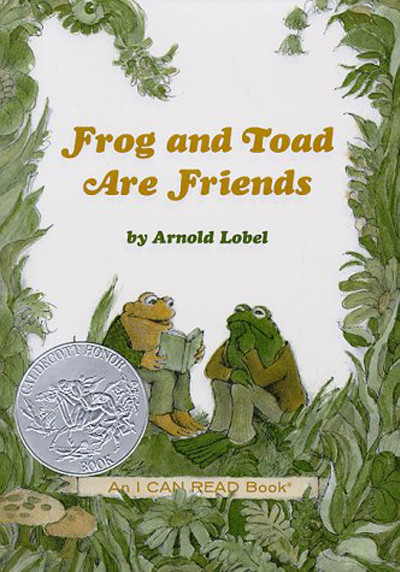Frog and Toad Aren’t Gay
It’s exasperatingly silly. The Frog and Toad series of little children’s books “was quite ahead of its time” when the stories appeared in the seventies, claims the author’s daughter. The reason, she explains in a New Yorker article, is that the two “are of the same sex, and they love each other.” Written by Colin Stokes, an editor at the magazine, the article is titled “‘Frog and Toad’: An Amphibious Celebration of Same-Sex Love,” and as I write this, it has been second on the magazine’s website’s most popular list for several hours.
My wife and I read the stories, many, many times, to our children. They weren’t our children’s favorite stories, but they liked them a lot and we enjoyed them enough not to mind rereading them. They are simply written, but not uncomplicated, stories about two best friends who often misunderstand each other but always end being friends again. Toad in particular has mystifying worries about his friendship with Frog but Frog responds with admirable patience and care.
It’s been several years now since I read one, so I’ll quote Stokes’ description. (Here’s a good summary from a Catholic website of what the writer rightly calls these “beautiful things, [that] are lovely because they are pure.”) In the story “The Surprise,” Frog and Toad go clean each other’s yard to surprise the other:
But, unbeknown to either of them, after the raking is done and as they are walking back to their respective homes, a wind comes and undoes all of their hard work, leaving their yards as leaf-strewn as they were at the beginning. Neither has any way of knowing of the other’s helpful act, and neither knows that his own helpful act has been erased. But Frog and Toad both feel satisfied believing that they have done the other a good turn
The story ends: “That night Frog and Toad were both happy when they each turned out the light and went to bed.”
That’s a typical Frog and Toad story. An amusing story, with complicating twists, that always ends with two friends who only want the other to be happy, and whose friendship makes the world a good place.
Lobel’s Sexuality
The author, Arnold Lobel, revealed to his family that he was gay a few years after he started the series. Thirteen years later he died of AIDS. “Lobel never publicly discussed a connection between the series and his sexuality,” writes Stokes,
but he did comment on the ways in which personal material made its way into his stories. In a 1977 interview with the children’s-book journal The Lion and the Unicorn, he said: “You know, if an adult has an unhappy love affair, he writes about it. He exorcises it out of himself, perhaps, by writing a novel about it. Well, if I have an unhappy love affair, I have to somehow use all that pain and suffering but turn it into a work for children.”
His daughter Adrianne says that she thinks the series “really was the beginning of him coming out.” It may have been, but if so, Lobel transmuted his struggles into stories of a pure and un-sexual friendship. From his own experience he made a universal story. He was an artist, not a propagandist.
He gave us a children’s story version of the ancient story of male friendship. Frog and Toad are of the same sex and they love each other. We get that from the stories. But there is not a word in the whole series to suggest the story of their friendship is the story, even a disguised story, of same-sex love.  The stories weren’t ahead of their time in that way. They were behind it.
The stories weren’t ahead of their time in that way. They were behind it.
When I read the stories, I pictured Frog and Toad as two old duffers, old bachelors who’d become friends in their youth and never married, and who settled into a lifetime friendship without a sexual or romantic thought ever going through their minds. I never once thought of them as a couple. Because they’re not. You have to read that into the story by giving sexual meanings to activities that have simpler and purer explanations. Like: They’re close friends because they’re close friends.
The Reality
Lobel’s daughter and the magazine’s writer use one fact about the writer to disregard the stories themselves. Maybe they were just being trendy. Many people still think it daring or provocative to find homosexuality in unexpected places.
David and Jonathan, Jesus and St. John, a lot of historical figures must have been lovers because, even though we have no evidence at all of this, they were close friends and close friendship must mean sex. That’s the logic. Ours is, as I say, a weirdly sexualized world.
And now the children’s book characters Frog and Toad. Good grief.
Or maybe, like so many people in our weirdly sexualized society, Adrianne Lobel and Colin Stokes don’t see the reality. Men can be friends like Frog and Toad are friends. Not lovers, which is an entirely different thing, but friends. I think Arnold Lobel knew that, even if his modern readers don’t.
Update: Kristen Grant (@kristenbgrant) points out that Lobel answeed this already, by titling one of the books Frog and Toad Are Friends. “I was just stuck by the truth of Lobel’s own title,” she writes. “They are friends. Which somehow = repression these days.”
Follow David Mills @DavidMillsWrtng. For this analysis of young adult stories, see the Association of Church Press award-winning Bad Books for Kids.







